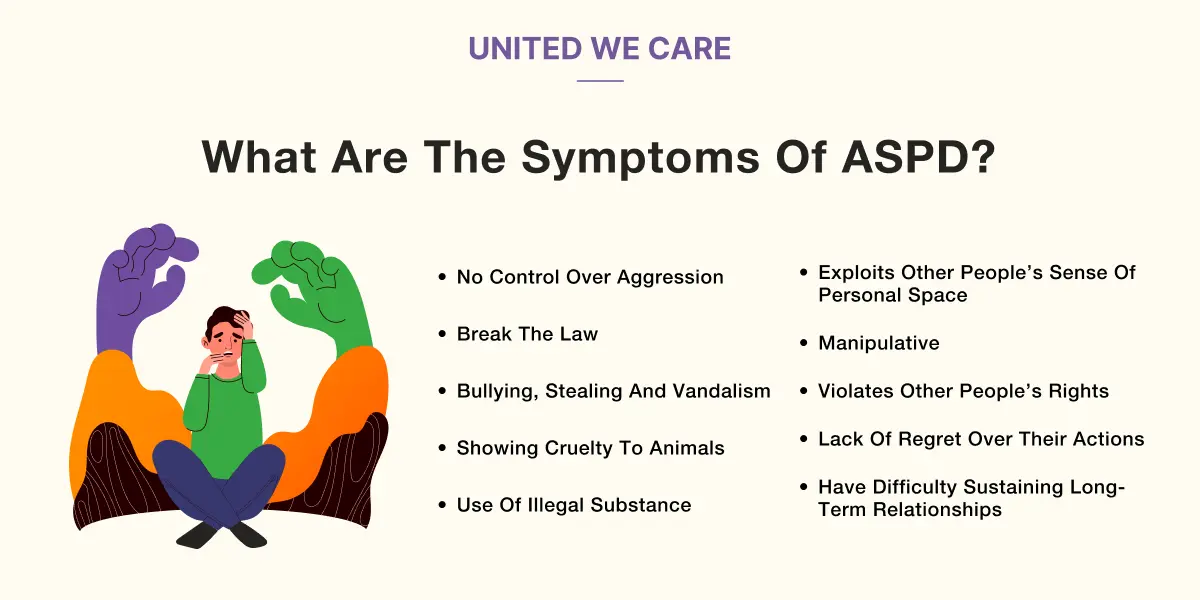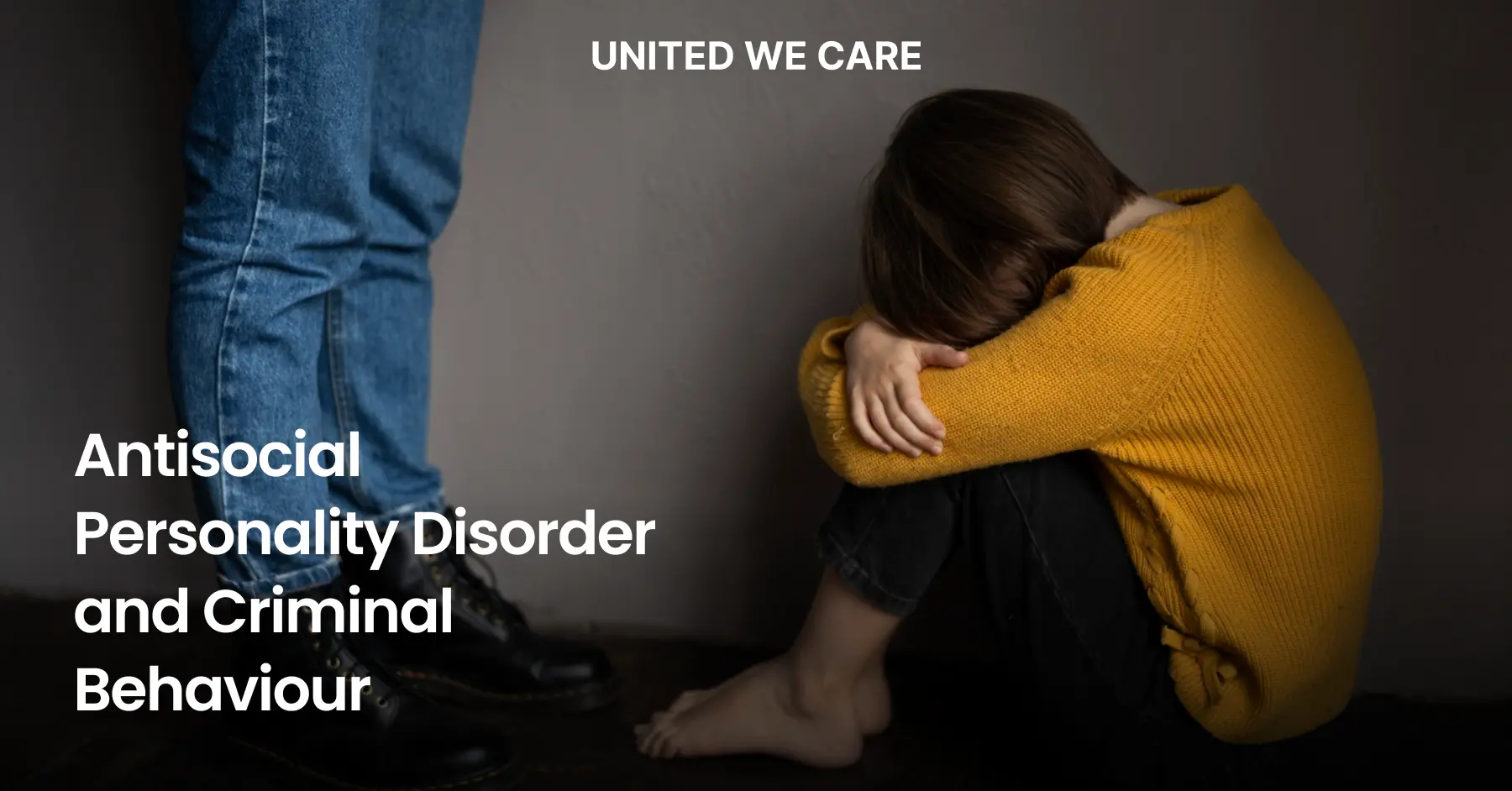Introduction
Think of a person who continues to ignore the concepts of good and bad and has no regard to right and wrong. Somebody who has no feelings for the rights other people possess. That is a typical picture of somebody with Anti Social Personality Disorder (ASPD).
People with disorders like so often engage in behaviors that are disturbing to many and unacceptable at large – from causing intentional discomfort to others to planned cruelty. People with ASPD frequently collide with legal troubles due to their violent, aggressive, and impulsive activities. For some individuals, substance use is comorbid, making recovery even more impossible. The disorder does not just cause a shift in their social lives but also their ability to fully take responsibility in close-knit relationships, work, and decision-making aspects for themselves.
ASPD causes people to clash with the law due to aggressive tendencies and impulsivity, and they are often pushed towards substance use as a resort.
What is Anti-social Personality Disorder, and how is it related to Criminal Behaviour?
Research shows that children with conduct disorder who later develop ASPD in adulthood are at high risk of engaging in criminal activity as adults. “Early onset of ASPD may promote chronic forms of violent behavior in 35-75% of cases.”
Anti-social Personality Disorder
According to the latest DSM-5, Antisocial Personality Disorder is a condition marked by a long-standing pattern of neglect for the rights of others, evident from as young as 15 years of age. Key signs that a person with ASPD displays are not compliant with societal norms, deceitful behaviour, rashness, aggression, irritability and an absence of conscience or guilt after inflicting pain on others. ASPD falls under Cluster B, which is categorized under Dramatic, Emotional or Erratic DIsorders.
Personality disorders are diagnosed by identifying persisting patterns that differ significantly from societal standards. Coping with people who have ASPD can be challenging as it often involves navigating through complex relationships marked by a lack of empathy and a disregard for other people. Caregivers need to prioritize their own mental wellbeing. This can include setting firm and healthy boundaries, seeking support from professionals, friends and family and even exploring therapy options for self. The internet is also a vast sea of information, and researching and reading more about the problems can also help.
Understanding Criminal Behavior
Criminal behavior encompasses actions that breach established laws of society, potentially attracting consequences like arrest or imprisonment. The factors that drive such behavior are not just limited to one reason. It is a mix of biological, psychological, social and environmental influences. Criminal activities can vary widely, ranging from theft and property crimes to server offenses like murder and assault to white-collar crimes like embezzlement.
Advances in criminology, psychology, and sociology are constantly reshaping our understanding of criminal behaviour and influencing how law bodies and social policies are developed. To effectively address criminal behavior, a comprehensive set of consequences like punishment, deterrence, rehabilitation and proactive prevention is required, keeping in mind the individual’s accountability for the health and safety of the larger community.
The Complex Interplay of Anti-Social Personality Disorder and Criminal Behavior
Antisocial Personality Disorder and Criminal behaviour do have a notable close-knit connection. The impulsivity and lack of empathy of a person with ASPD can lead to the negligence of social norms and legal issues. Although it is important to note that not all individuals with ASPD are involved in criminal activities, the characteristics of the disorder just make them more vulnerable to committing such behavior.
People with this disorder often have a strong tendency to commit criminal behaviour that is pushed by an inherent disrespect for others, impulsivity, and a lack of empathy. This might show itself in acts of violation of societal standards and regulations. The impulsivity can lead to illegal behavior, and the use of harmful drugs and that can trigger even deeper issues. People with ASPD often disregard others and have no sense of care for other people’s well-being. All these things contribute to their chances of ending up imprisoned. This creates a vicious cycle they cannot escape because that leads to a lack of stable relationships, no regular work life, and legal troubles, causing them a lot of monetary as well as mental toll. While it is not compulsory that everybody who has ASPD engages in illegal substance use, commits crimes or has such hefty consequences all those inert traits make them more vulnerable to fall prey to these situations.
People with underlying criminality and ASPD usually require a combination of psychotherapy and medication to be managed. The generalization of ASPD raises significant challenges, emphasizing the importance of early intervention and approaches to addressing both the causes and potential criminal manifestations.
How to know if someone has Antisocial Personality Disorder and also engages in Criminal activities
A person with an antisocial personality disorder will have a history of disruptive and aggressive behaviour as a child, such as absences (not going to school), delinquency (for example, committing crimes or substance abuse), and other disruptive and aggressive behaviors. It’s not known why some people develop antisocial personality disorder, but both genetics and traumatic childhood experiences, such as child abuse or neglect, are thought to play a role.
While the condition may begin in childhood, it cannot be officially diagnosed before the age of 18. Children who display these symptoms are diagnosed with conduct disorder.
Criminal activity is a prominent aspect of antisocial personality disorder, and people with the disorder are more likely to commit crimes and end up in prison at some time in their lives.
Men with the condition are more likely than those who do not have it to:
- Alcohol and drug abuse
- Have a higher risk of dying prematurely as a result of reckless behavior or suicide attempts
Symptoms Of Antisocial Personality Disorder
Adults with antisocial personality disorder are also more likely to have relationship issues, be unemployed, or be homeless.
Before the age of 15, a person must demonstrate disrespect for and violation of the rights of others to be diagnosed with ASPD. This neglect is manifested by at least one of seven symptoms:

- Exploits other people’s sense of personal space
- Manipulative
- Violates other people’s rights
- Lack of regret over their actions
- Have difficulty sustaining long-term relationships
- No control over aggression
- Break the law
- Bullying, Stealing and Vandalism
- Showing cruelty to animals
- Use of illegal substances
In addition to exhibiting at least one of these symptoms, the person must be at least 18 years old and not engage in antisocial behavior as a result of another condition ranging from bipolar disorder to schizophrenia.
Some critics argue that the DSM diagnostic criteria are overly focused on criminal behaviours.
Concerns have been expressed that the diagnosis may be misapplied to people living in low-income or urban areas when appearing antisocial behaviour may be part of a protective survival strategy. As a result, the prevalence of this disorder has probably been exaggerated.
Strategies for Treating Antisocial Personality Disorder and Redirecting Lives Away from Criminal Activities
Because ASPD is difficult to treat, it’s difficult to predict how the condition will progress over time. Personality disorders are lifelong behavioural patterns, and there is no cure for ASPD. Nonetheless, ASPD symptoms tend to peak in late adolescence and late twenties. Symptoms may improve or diminish on their own by the forties. Aggressive and criminal behaviour, in particular, may decline as people get older.
- Behavioural treatments that reward socially acceptable mannerisms and provide negative consequences for illegal and unacceptable behaviour can be partially effective.
- Often, the comorbidity of other disorders like addiction and use of illegal substances require immediate attention and treatment.
- For people who have committed violent crimes, imprisonment can reduce the harm they cause in their surroundings, but that might not be the best treatment for them as research shows that violent offenders with personality disorders have a hard time learning from their mistakes (lack of remorse) and do not respond to punishment at all.
- It is unknown whether people with antisocial personality disorder can empathize. Some research implies that they can experience empathy but may need to turn it on, implying a potential area of future therapeutic research.
- The main form of treatment for antisocial personality disorder is long-term Psychological therapy such as CBT (Cognitive behaviour therapy). The therapy mainly focuses on addressing specific problems such as impulsivity, interpersonal difficulties and so on.
- There are no medicines specifically approved by the Food and Drug Administration (FDA) to treat antisocial personality disorder. Healthcare providers may prescribe medicines for conditions that sometimes occur along with antisocial personality disorder, such as anxiety or depression, or for symptoms of aggression.
Coping and Support
People with antisocial personality disorder frequently act out and harm others, with little regret. If a family has a loved one who suffers from antisocial personality disorder, they must seek treatment for themselves too.
A mental health professional teaches the family skills on setting boundaries and protecting themselves from aggression, violence, and anger which comes naturally to a person with ASPD.
When a family member or other loved one chooses, or is forced, to seek treatment for antisocial personality disorder, it is critical to be supportive and bright-eyed. While it is obvious that you cannot turn off your feelings for the person who has been diagnosed with a mental health issue, your boundaries with the person must remain clear.
Conclusion
Anti-social personality disorder is not just a clinical term but a challenging aspect of many lives. It is crucial to remember that behind the diagnosis are individuals with stories, complexities, and the potential for change.
While dealing with people with this disorder, it is crucial to involve personalized therapy and understanding not just for the person with ASPD but also for the people around them. By fostering empathy, promoting mental health awareness, and breaking down the barriers of stigma, we can all come together to create an environment where those with ASPD can find support and, most importantly, hope.
Amid the complex terrain, it’s vital to recognize the humanity in every individual, regardless of their mental health challenges. Each person has the capacity for growth and transformation. It is vital to curate an environment where compassion guides our interactions, understanding over judgment, and hope exists for all. Learn more from the experts at United We Care!
References
[1] Glenn, A.L., Johnson, A.K. and Raine, A., 2013. Antisocial personality disorder: a current review. Current psychiatry reports, 15, pp.1-8.
[2] Yu, R., Geddes, J.R. and Fazel, S., 2012. Personality disorders, violence, and antisocial behavior: a systematic review and meta-regression analysis. Journal of personality disorders, 26(5), pp.775-792.
[3] De Brito, S.A. and Hodgins, S.H.E.I.L.A.G.H., 2009. Antisocial personality disorder. Personality, personality disorder and violence, 42, pp.133-153.









